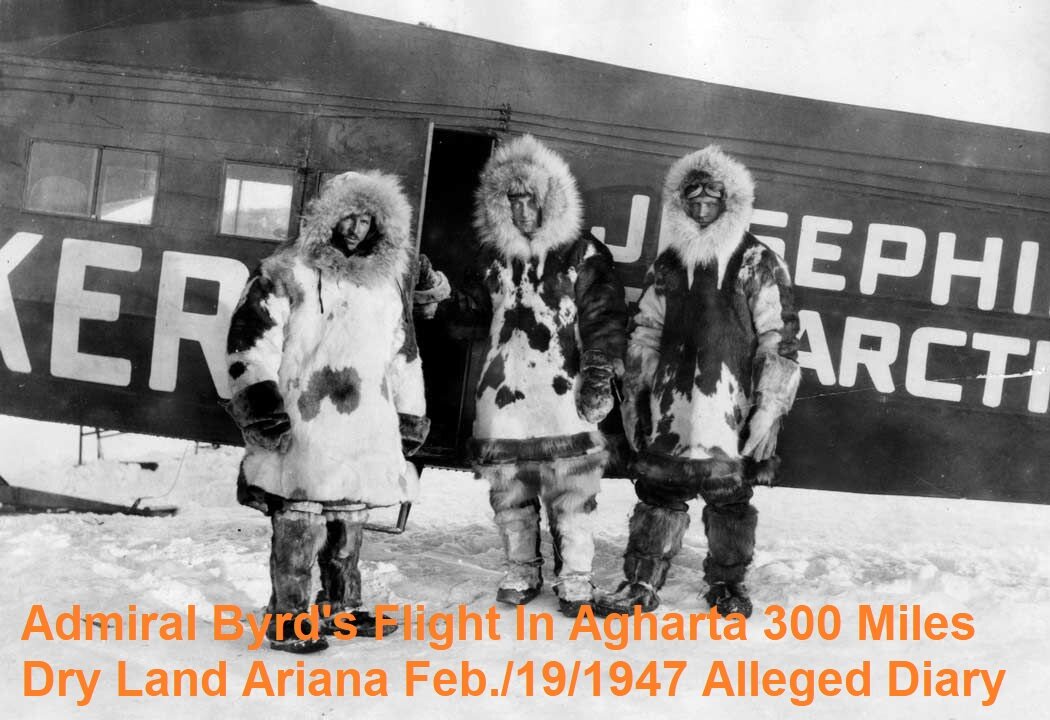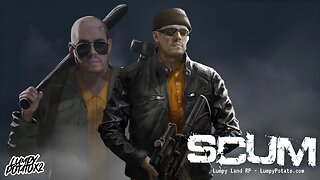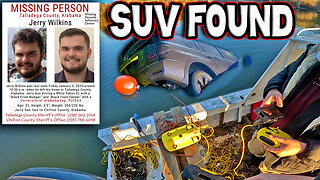Premium Only Content

Admiral Byrd's Flight In Agharta 300 Miles Dry Land Ariana Feb./19/1947 Alleged Diary
In 1947 Secretary of the Navy James Forrestal sent a naval task force to Antarctic including Admiral Nimitz, Admiral Krusen and Admiral Byrd, called Operation Highjump. It was an expedition to find “coal deposits” and other valuable resources, but in actuality they were trying to find the underground base of the aryans in Neuschwabenlandt. The nazis had done a very detailed study of Antarctic and were alleged to have built an underground base there. In this regard however, the aryans have had an underground habitation in Antarctic for more than a million years. They flew over as much of the continent as they could in the short three month “summer” period, mapping and recording magnetic data. Magnetometers show anomalies in the Earth’s magnetism, if there is a “hollow” place under the surface ice or ground, it will show up on the meter.”
“Neuschwabenland is Ostantarktika coastal region, extending from about 12 ° West to 18 ° East and 70 ° to 75 ° South, an area of 600,000 km ². The name comes from Schwaben, the German ship to Antarctica Expedition 1938-1939. Neuschwabenland forms the western part of Norway supported the Queen Maud Land. This claim is not recognized internationally.”
Secret Diary of Admiral Byrd THE FLIGHT TO THE LAND BEYOND THE NORTH POLE - A Copy Of Admiral Richard B. BYRD foreword by: Dr. William Bernard Ph.d., D.D.
The reader of the following documentation should find a striking example of dire devotion. Especially when one considers that this log diary was written in the year 1947 in the months of February and March, under circumstances that evidently defied the imagination and credibility, for those times as any others. Here is dealt with the evident answers the origin of the so-called UFOs , as well as the Hollow Earth , or as the admiral described.
The Land Beyond The Poles
The reader will relive that period as he reads this document. To say it is fascinating is to place it mildly, but to read it now for yourself, I know that you will conclude, in the Admirals own words " Just as the long night of the Arctic ends, the brilliant sunshine of truth shall come forth again, and those who are of Darkness shall fall in its Light". DR. D.B.
Admiral Richard B. Byrd's Diary (Feb. Mar. 1947 )
The exploration flight over the North Pole ( The Inner Earth My Secret Diary )
I must write this diary in secrecy and obscurity. It concerns my Arctic flight of the nineteenth day of February in the year of Nineteen and Forty-Seven.
There comes a time when the rationality of men must fade into insignificance and one must accept the inevitability of the Truth! I am not at liberty to disclose the following documentation at this writing ...perhaps it shall never see the light of public scrutiny, but I must do my duty and record here for all to read one day. In a world of greed and exploitation of certain of mankind can no longer suppress that which is truth.
FLIGHT LOG: BASE CAMP ARCTIC, 2/19/1947
0600 Hours- All preparations are complete for our flight northward and we are airborne with full fuel tanks at 0610 Hours.
0620 Hours- fuel mixture on starboard engine seems too rich, adjustment made and Pratt Whittneys are running smoothly.
0730 Hours- Radio Check with base camp. All is well and radio reception is normal.
0740 Hours- Note slight oil leak in starboard engine, oil pressure indicator seems normal, however.
0800 Hours- Slight turbulence noted from easterly direction at altitude of 2321 feet, correction to 1700 feet, no further turbulence, but tail wind increases, slight adjustment in throttle controls, aircraft performing very well now.
0815 Hours- Radio Check with base camp, situation normal.
0830 Hours- Turbulence encountered again, increase altitude to 2900 feet, smooth flight conditions again.
0910 Hours- Vast Ice and snow below, note coloration of yellowish nature, and disperse in a linear pattern. Altering course foe a better examination of this color pattern below, note reddish or purple color also. Circle this area two full turns and return to an assigned compass heading. Position check made again to base camp, and relay information concerning colorations in the Ice and snow below.
0910 Hours- Both Magnetic and Gyro compasses beginning to gyrate and wobble, we are unable to hold our heading by instrumentation. Take bearing with Sun compass , yet all seems well. The controls are seemingly slow to respond and have sluggish quality, but there is no indication of Icing!
0915 Hours- In the distance is what appears to be mountains.
0949 Hours- 29 minutes elapsed flight time from the first sighting of the mountains, it is no illusion. They are mountains and consist of a small range that I have never seen before!
0955 Hours- Altitude change to 2950 feet, encountering strong turbulence again.
1000 Hours- We are crossing over the small mountain range and still proceeding northward as best as can be ascertained. Beyond the mountain range is what appears to be a valley with a small river or stream running through the center portion. There should be no green valley below! Something is definitely wrong and abnormal here! We should be over Ice and Snow! To the portside are great forests growing on the mountain slopes. Our navigation Instruments are still spinning, the gyroscope is oscillating back and forth!
1005 Hours- I alter altitude to 1400 feet and execute a sharp left turn to better examine the valley below. It is green with either moss or a type of tight-knit grass. The Light here seems different. I cannot see the Sun anymore. We make another left turn and we spot what seems to be a large animal of some kind below us. It appears to be an elephant ! NO!!! It looks more like a mammoth ! This is incredible! Yet, there it is! Decrease altitude to 1000 feet and take binoculars to better examine the animal. It is confirmed - it is definitely a mammoth-like animal! Report this to base camp.
1030 Hours- Encountering more rolling green hills now. The external temperature indicator reads 74 degrees Fahrenheit! Continuing on our heading now. Navigation instruments seem normal now. I am puzzled over their actions. Attempt to contact base camp. Radio is not functioning!
1130 Hours- Countryside below is more level and normal (if I may use that word). Ahead we spot what seems to be a city!!!! This is impossible! Aircraft seems light and oddly buoyant. The controls refuse to respond!! My GOD!!! Off our port and starboard wings are a strange type of aircraft. They are closing rapidly alongside! They are disc-shaped and have a radiant quality to them. They are close enough now to see the markings on them. It is a type of Swastika !!! This is fantastic. Where are we! What has happened? I tug at the controls again. They will not respond!!!! We are caught in an invisible vice grip of some type!
1135 Hours- Our radio crackles and a voice comes through in English with what perhaps is a slight Nordic or Germanic accent! The message is: Welcome, Admiral, to our domain. We shall land you in exactly seven minutes! Relax, Admiral, you are in good hands. I note the engines of our plane have stopped running! The aircraft is under some strange control and is now turning itself. The controls are useless.
1140 Hours- Another radio message received. We begin the landing process now, and in moments the plane shudders slightly, and begins a descent as though caught in some great unseen elevator! The downward motion is negligible, and we touch down with only a slight jolt!
1145 Hours- I am making a hasty last entry in the flight log. Several men are approaching on foot toward our aircraft. They are tall with blond hair. In the distance is a large shimmering city pulsating with rainbow hues of color. I do not know what is going to happen now, but I see no signs of weapons on those approaching. I hear now a voice ordering me by name to open the cargo door. I comply. END LOG
From this point, I write all the following events here from memory. It defies the imagination and would seem all but madness if it had not happened.
The radioman and I are taken from the aircraft and we are received in a most cordial manner. We were then boarded on a small platform-like conveyance with no wheels! It moves us toward the glowing city with great swiftness. As we approach, the city seems to be made of a crystal material. Soon we arrive at a large building that is a type I have never seen before. It appears to be right out of the design board ofFrank Lloyd Wright , or perhaps more correctly, out of a Buck Rogers setting!! We are given some type of warm beverage that tasted like nothing I have ever savored before. It is delicious. After about ten minutes, two of our wondrous appearing hosts come to our quarters and announce that I am to accompany them. I have no choice but to comply. I leave my radioman behind and we walk a short distance and enter into what seems to be an elevator. We descend downward for some moments, the machine stops, and the door lifts silently upward! We then proceed down a long hallway that is lit by a rose-colored light that seems to be emanating from the very walls themselves! One of the beings motions for us to stop before a great door. Over the door is an inscription that I cannot read. The great door slides noiselessly open and I am beckoned to enter. One of my hosts speaks. Have no fear, Admiral, you are to have an audience with the Master...
I step inside and my eyes adjust to the beautiful coloration that seems to be filling the room completely. Then I begin to see my surroundings. What greeted my eyes is the most beautiful sight of my entire existence. It is in fact too beautiful and wondrous to describe. It is exquisite and delicate. I do not think there exists a human term that can describe it in any detail with justice! My thoughts are interrupted in a cordial manner by a warm rich voice of melodious quality, I bid you welcome to our domain, Admiral. I see a man with delicate features and with the etching of years upon his face. He is seated at a long table. He motions me to sit down in one of the chairs. After I am seated, he places his fingertips together and smiles. He speaks softly again and conveys the following.
We have let you enter here because you are of noble character and well-known on the Surface World, Admiral. Surface World , I half-gasp under my breath! Yes," the Master replies with a smile, 'you are in the domain of the Arianni , the Inner World of the Earth . We shall not long delay your mission, and you will be safely escorted back to the surface and for a distance beyond. But now, Admiral, I shall tell you why you have been summoned here. Our interest rightly begins just after your race exploded the first atomic bombs over Hiroshima and Nagasaki , Japan. It was at that alarming time we sent our flying machines, the "Flugelrads ", to your surface world to investigate what your race had done. That is, of course, past history now, my dear Admiral, but I must continue on. You see, we have never interfered before in your race's wars, and barbarity, but now we must, for you have learned to tamper with a certain power that is not for man, namely, that of atomic energy. Our emissaries have already delivered messages to the powers of your world, and yet they do not heed. Now you have been chosen to be witness here that our world does exist. You see, our Culture and Science are many thousands of years beyond your race, Admiral.' I interrupted, 'But what does this have to do with me, Sir?
The Master's eyes seemed to penetrate deeply into my mind, and after studying me for a few moments he replied, Your race has now reached the point of no return, for there are those among you who would destroy your very world rather than relinquish their power as they know it... I nodded, and the Master continued, In 1945 and afterward, we tried to contact your race, but our efforts were met with hostility, our Flugelrads were fired upon. Yes, even pursued with malice and animosity by your fighter planes. So, now, I say to you, my son, there is a great storm gathering in your world, a black fury that will not spend itself for many years. There will be no answer in your arms, there will be no safety in your science. It may rage on until every flower of your culture is trampled, and all human things are leveled in vast chaos. Your recent war was only a prelude of what is yet to come for your race. We here see it more clearly with each hour..do you say I am mistaken?
'No,' I answer, 'it happened once before, the dark ages came and they lasted for more than five hundred years.'
Yes, my son, replied the Master, the dark ages that will come now for your race will cover the Earth like a pall, but I believe that some of your race will live through the storm, beyond that, I cannot say. We see at a great distance a new world stirring from the ruins of your race, seeking its lost and legendary treasures, and they will be here, my son, safe in our keeping. When that time arrives, we shall come forward again to help revive your culture and your race. Perhaps, by then, you will have learned the futility of war and its strife...and after that time, certain of your culture and science will be returned for your race to begin anew. You, my son, are to return to the Surface World with this message.....
With these closing words, our meeting seemed at an end. I stood for a moment as in a dream....but, yet, I knew this was reality, and for some strange reason I bowed slightly, either out of respect or humility, I do not know which.
Suddenly, I was again aware that the two beautiful hosts who had brought me here were again at my side. 'This way, Admiral,' motioned one. I turned once more before leaving and looked back toward the Master. A gentle smile was etched on his delicate and ancient face. Farewell, my son, he spoke, then he gestured with a lovely, slender hand a motion of peace, and our meeting was truly ended.
Quickly, we walked back through the great door of the Master's chamber and once again entered into the elevator. The door slid silently downward and we were at once going upward. One of my hosts spoke again, We must now make haste, Admiral, as the Master desires to delay you no longer on your scheduled timetable and you must return with his message to your race.
I said nothing. All of this was almost beyond belief, and once again my thoughts were interrupted as we stopped. I entered the room and was again with my radioman. He had an anxious expression on his face. As I approached, I said, It is all right, Howie , it is all right. The two beings motioned us toward the awaiting conveyance, we boarded, and soon arrived back at the aircraft. The engines were idling and we boarded immediately. The whole atmosphere seemed charged now with a certain air of urgency. After the cargo door was closed the aircraft was immediately lifted by that unseen force until we reached an altitude of 2700 feet. Two of the aircraft were alongside for some distance guiding us on our return way. I must state here, the airspeed indicator registered no reading, yet we were moving along at a very rapid rate.
215 Hours- A radio message comes through. We are leaving you now, Admiral, your controls are free. Auf Wiedersehen!!!! We watched for a moment as the flugelrads disappeared into the pale blue sky.
The aircraft suddenly felt as though caught in a sharp downdraft for a moment. We quickly recovered her control. We do not speak for some time, each man has his thoughts....
ENTRY IN FLIGHT LOG CONTINUES:
220 Hours- We are again over vast areas of ice and snow, and approximately 27 minutes from base camp. We radio them, they respond. We report all conditions normal....normal. Base camp expresses relief at our re-established contact.
300 Hours- We land smoothly at base camp. I have a mission.....
END LOG ENTRIES.
March 11, 1947. I have just attended a staff meeting at the Pentagon . I have stated fully my discovery and the message from the Master. All is duly recorded. The President has been advised. I am now detained for several hours (six hours, thirty- nine minutes, to be exact.) I am interviewed intently by Top Security Forces and a medical team. It was an ordeal!!!! I am placed under strict control via the national security provisions of this United States of America . I am ORDERED TO REMAIN SILENT IN REGARD TO ALL THAT I HAVE LEARNED, ON THE BEHALF OF HUMANITY1111 Incredible! I am reminded that I am a military man and I must obey orders.
30/12/56: FINAL ENTRY:
These last few years elapsed since 1947 have not been kind...I now make my final entry in this singular diary. In closing, I must state that I have faithfully kept this matter secret as directed all these years. It has been completely against my values of moral rights. Now, I seem to sense the long night coming on and this secret will not die with me, but as all truth shall, it will triumph and so it shall.
This can be the only hope for mankind. I have seen the truth and it has quickened my spirit and has set me free! I have done my duty toward the monstrous military-industrial complex. Now, the long night begins to approach, but there shall be no end. Just as the long night of the Arctic ends, the brilliant sunshine of Truth shall come again....and those who are of darkness shall fall in it's Light.. FOR I HAVE SEEN THAT LAND BEYOND THE POLE, THAT CENTER OF THE GREAT UNKNOWN. Admiral Richard E. Byrd United States Navy 24 December 1956
OPERATION HIGHJUMP: 1946-47 EXPEDITION TO EXPLORE ANTARCTICA FROM THE AIR The celebrations surrounding the end of World War II had barely ended when the Cold War commenced between the Western Allies and their Soviet former partner. The war’s end also signaled the onset of the atomic age and a corresponding desire among the victorious nations to secure supplies of uranium and other natural resources. With its vast mineral deposits amid largely unexplored territory, Antarctica was considered a promising potential repository of those vital resources. As such, the United States sought to establish a presence in Antarctica and explore the frigid continent using naval and air assets.
On August 26, 1946, chief of U.S. naval operations Admiral Chester Nimitz announced that a massive combined military expedition dubbed Operation Highjump would be launched into Antarctica in December during summer in the Southern Hemisphere. The operation involved 13 ships, more than 4,700 personnel and a variety of aircraft, including newly purchased helicopters. The naval contingent, known as Task Force 68, was commanded by Rear Adm. Richard H. Cruzen and Rear Adm. Richard E. Byrd commanded the scientific and research elements, with six Douglas R4D-5L aircraft (Navy C-47As) at his disposal.
After Admiral Byrd and his team established the Little America IV base near where three previous bases had been situated, aircraft would photograph as much of Antarctica’s land surface as possible during the three-month operation. Six Martin PBM-5 Mariner flying boats were to operate from the seaplane tenders Pine Island and Currituck, photographing the east and west coasts, while the R4Ds surveyed the interior.
On November 12 Admiral Byrd stated at a press conference that Operation Highjump “was primarily a military mission to train naval personnel, test ships, planes and the new helicopters under frigid zone conditions. Develop techniques for establishing and maintaining air bases in Antarctic. A secondary objective was to increase knowledge of hydrographic, geographic, meteorological, geological and electromagnetic conditions of the area. The PBMs and R4Ds would play a major role in the objectives.” A second, unstated objective was to prove Navy capabilities to President Harry Truman, who sought reductions in America’s postwar military budget.
The Soviets eyed the Operation Highjump announcement warily. One of their naval journals stated, “U.S. measures in Antarctica testify that American military circles are seeking to subject the polar regions to their control and create military bases.”
The operation involved significant planning and equipment, from gloves, coats and provisions to tiny snow boots to protect sled dogs’ paws, and even a Christmas tree and Santa Claus suit since the ships would be at sea on December 25. Thousands of pieces of bamboo were carved and had orange flags attached to be used as route and landing zone markers.
Task Force 68 consisted of three separate naval groups, each with a specific mission. Captain George J. Dufek commanded the Eastern Group, with Pine Island carrying three PBM Mariners. The Western Group, commanded by Captain Charles A. Bond, included Currituck with the other three Mariners. Admiral Cruzen’s Central Group and the aircraft carrier Philippine Sea, with Byrd as officer in charge, filled out the task force.
The PBM flight crews were all inexperienced volunteers, having only had a month to train for the mission. One crew member characterized the flying as “no weather stations, inhuman landscape, traditional navigation aids useless, maps limited, knowing that the flying would not be safe. You were trapped in an aircraft for five hours, in zones where the weather changed minute by minute.”
The operation also involved several Sikorsky HO3S-1 helicopters, capable of a carrying a pilot, three passengers and cargo, with a 360-mile range. The smaller Sikorsky HNS-1 accommodated a pilot and one passenger and had a range of 130 miles. One key aspect of the preparations was the construction of special platforms on the ships for the helicopters and hours upon hours spent practicing takeoffs and landings.
Flying out ahead of the icebreakers to search for clear passages through the ice, the helicopters served as the eyes of the fleet. One helicopter was allotted to each of the icebreakers and one to the carrier Philippine Sea. Besides conducting reconnaissance, each was large enough to undertake rescue operations. Two helicopters would be lost during Operation Highjump.
The Central Group was the command center for the operation. Its ships broke through the ice with the help of the Coast Guard cutter Northwind and the new Navy cutter Burton Island, which joined the operation later. Northwind was critical to the mission since the thick ice could crack open a thin-skinned ship like a can opener. Norwegian trawlers in the area reported the ice to be the heaviest in more than 40 years. Upon reaching the Ross Ice Shelf, the Central Group ships would disgorge the small aircraft, ice vehicles, supplies, tents and sled dogs. Then the men would move inland to establish Little America IV, headquarters for Byrd and his six R4Ds.
Getting the big Douglas birds to Antarctica presented a formidable challenge as, lacking the range to fly from a land base, they had to be launched from Philippine Sea. Each was outfitted with aluminum skis attached to the landing gear struts, with the tires providing a two-inch clearance between the skis and the carrier deck. In order to get airborne, each R4D was outfitted with four JATO (jet-assisted takeoff) bottles. It was a one-way trip to Little America IV since they could not land on the carrier and would be left behind when the operation was completed. The tail, wings and midsection of each aircraft were painted with bright orange stripes for enhanced visibility in case they went down on the ice.
The Eastern, Western and Central group ships departed at different intervals and ports on both coasts. Northwind left Norfolk, Va., on December 2, headed to Antarctica via the Panama Canal. The ships stationed in the Pacific left San Diego, Calif., the same day. The Central Group and Philippine Sea did not depart Norfolk until January 2, 1947. The carrier was the last to arrive due to the construction of the base and airfield.
Grumman J2F-6 Duck amphibians with the group performed reconnaissance, supply and, if needed, rescue and medical missions. Once the expedition ships reached heavy ice, the HNS-1 helicopter was employed to fly at 600 feet and act as a scout to radio where clear openings were. Safe passage involved ships operating at low speed, wending their way through the ice.
The low temperatures made the air denser and increased the helicopters’ efficiency. Even so, 60 minutes of prep time was required to heat the fuel, oil, engine and remove any ice from the rotor blades prior to a mission. Operating from Pine Island, an HO3S-1 carrying Captain Dufek flew to Scott Island on a reconnaissance mission. During its return flight the rotor blades became so coated with ice that the helicopter crashed several feet short of the ship’s landing pad. The HO3S-1 was lost but Dufek and the pilot were saved before freezing to death in the frigid water.
The first Central Group ships arrived at the Ross Ice Shelf on January 17. The next two days were spent searching for a site for Little America IV. Then the tractors, jeeps, M29 Weasels, bulldozers and other snow-track vehicles were unloaded. The base comprised large tents, weather equipment, Quonset huts, three packed-snow runways and one short runway made of steel matting. Lieutenant Jim Cornish had the honor of flying the first helicopter in and out of Little America IV. By the time Operation Highjump was completed on March 1, a dozen helo flights had been made to the base.
On January 22, Philippine Sea lost an HO3S-1 helicopter when it was caught in strong winds on takeoff and crashed into the sea. The pilot was rescued but the accident was indicative of the hard lessons learned by pilots and crew in the early days of helicopters.
The carrier was within 600 miles of Little America IV on January 29, close enough for the six R4Ds to prepare for takeoff. The flight deck was only 300 feet long, but with the JATO assist the first aircraft, with Byrd aboard, was airborne in 100 feet. A second aircraft took off and both made it to Little America IV safely. As the weather closed in the next day, the remaining four R4Ds followed and reached the base with only an hour to spare before conditions deteriorated. Upon landing it was judged advisable to remove the aircraft tires and only employ the skis.
During Highjump the six R4Ds completed 28 photographic flights and captured more than 21,000 images. The helicopters and PBMs also flew photo missions along the coasts. At the completion of the operation, more than 70,000 photos had been taken and over 1.5 million square miles of territory had been surveyed. “Our hope is that now we have the entire material to make a detailed map of all of Antarctica,” said Byrd.
Flying in subzero conditions meant that the oil in each aircraft had to be heated, special fuel was used and the engines were warmed up for a long time prior to takeoff. Ensuring that all the ice was removed from the propellers, wings and tail surfaces was also critical.
Besides photo equipment, each aircraft carried various instruments to search for mineral deposits and other geological features. On one of Byrd’s flights magnetic instrument pods detected a massive coal deposit. When a lake was discovered in a large ice-free patch of land, a PBM landed to scoop up water samples.
The experiences of the PBM-5 Mariner George 1 were indicative of the difficulties airmen faced during Operation Highjump. The aircraft’s launch had been delayed for days by fog, snow squalls and heavy seas. Finally, on December 26, the weather cleared and allowed for aerial mapping of the east coast. George 1 was lowered over the side of Pine Island and almost immediately one of the launch boats crashed into a wing and damaged a pontoon. The Mariner had to be lifted back onto the ship for repairs.
When the weather cleared again on December 29, George 1 was once more lowered over the side and took off with a crew of nine, including Pine Island’s skipper Captain Henry H. Caldwell, who was along as an observer. The other two Mariners were launched shortly afterward. Each PBM carried survival equipment consisting of 100 days’ worth of rations, skis, sleds, medicine, warm clothes and sleeping bags.
After they had been flying for three hours, the weather took a turn for the worse. George 1 climbed to 1,000 feet to get above the snow and ice. Instead it became involved in what is known as an “ice blink,” with streams of snow reflecting the sunshine and making it difficult to see—similar to the reflections experienced while driving a car at night through a snowstorm.
Unable to see the ground, pilot Ralph LeBlanc struck an object and tried to pull up, but the fuel tank ripped open and the aircraft crashed in a fireball. Two crewmen were killed instantly when they were thrown through the propeller blades.
For 13 days weather conditions prevented any attempt to search for the downed PBM. Finally a search plane spotted burned wreckage and men on the ground. Their signal, painted on the wrecked Mariner’s wing, indicated that three of the crewmen were dead. Since it was impossible to land in the area, messages were dropped directing the survivors to make their way to the open water about 10 miles to the north. An aircraft marked the route with orange flags and then proceeded to parachute drop food, medicine and other supplies.
The men successfully made the trek—a feat in itself—and were brought back to Pine Island by the rescue aircraft. George 1’s radioman Wendell Henderson, flight engineer Frederick Williams and navigator Maxwell Lopez had been killed. Pilot LeBlanc would lose both of his badly burned and frozen legs.
In another dramatic incident, during a four-plane flight to map as far as the South Pole an R4D carrying Admiral Byrd almost met a similar fate. After dropping a United Nations flag over the South Pole, Byrd’s crew continued their photo mission. Suddenly one of the engines seized and they began to lose altitude. Facing the prospect of an emergency landing and difficult rescue, Byrd ordered any item that was not bolted down thrown out of the aircraft, save for the photographic material. The R4D slowly began to gain altitude and in the tradition of the tough Douglas aircraft arrived back at Little America IV and made a safe landing.
As winter approached the weather deteriorated—only five days were favorable for flying in February. Soon the process began to shut down the operation and leave before the full force of winter set in.
The R4Ds’ fuel, oil and other fluids were drained. Tail sections were dismantled and stored in the hope that a future expedition could reassemble the transports and use them again. Sadly, this was not to be. By 1958 the ice shelf on which Little America IV was sited had broken away and drifted into open water. The six aircraft disappeared.
Among other losses, a PBM had been blown overboard off Currituck in a massive ocean storm prior to reaching the objective and disappeared in the high waves. A second Mariner suffered damage to its nose.
The stars of Operation Highjump appeared to be the helicopters employed by the fleet. In his report, Northwind’s commander, Captain Charles W. Thomas, emphasized, “Helicopter best piece of equipment ever carried on ice vessels.” He further noted that “In a well organized ice convoy, the commander needs to know what his ships will encounter within the next day….Hence helicopter reconnaissance within a radius of twenty five miles was essential….Battering a track through 650 miles of ice in eighteen days would not have been possible without helicopter reconnaissance. Had the Task Group penetrated the pack without ‘eyes’ it would have arrived too late in the season to establish a base; then conduct an aerophotographic exploration of a hidden continent. In other words, the Central Group would have been obliged to turn about and get out of the pack before being able to erect Little America No. 4.”
Operation Highjump was chronicled in a film shot by military photographers and narrated by Hollywood actors Robert Taylor, Robert Montgomery and Van Heflin, all of whom had served in the Navy during WWII. Released in movie theaters as The Secret Land, it won the 1948 Academy Award for Best Documentary Feature. Other operations would follow, including the U.S. Navy’s Operation Windmill in 1947-48, and eventually treaties were signed by all involved nations to ensure that Antarctica remained a nonmilitary zone.
-
 15:11:23
15:11:23
What If Everything You Were Taught Was A Lie?
7 days agoOur 900th Video A True History Documentaries 15 Hours Ancient, Medieval, Modern Civilizations
3.21K9 -
 LIVE
LIVE
ttvglamourx
1 hour ago $0.38 earnedEGIRL VS TOXIC COD LOBBIES !DISCORD
182 watching -
 3:19:17
3:19:17
LumpyPotatoX2
3 hours agoSCUM: Lumpy Land RP Server - Day #1 - #RumbleGaming
2.84K2 -
 1:42:59
1:42:59
Game On!
16 hours ago $4.89 earnedTop 10 Super Bowl Bets You Can't Afford To Miss!
37.3K4 -
 2:17:02
2:17:02
Tundra Tactical
20 hours ago $18.57 earnedTundra Nation Live : Shawn Of S2 Armament Joins The Boys
123K26 -
 11:00:11
11:00:11
tacetmort3m
1 day ago🔴 LIVE - SOLO RANK GRINDING CONTINUES - MARVEL RIVALS
191K3 -
![Shadows Of Chroma Tower, Alpha Playtest [Part 1]](https://1a-1791.com/video/fwe2/1d/s8/1/5/Q/U/n/5QUnx.0kob-small-Shadows-Of-Chroma-Tower-Alp.jpg) 13:29:21
13:29:21
iViperKing
23 hours agoShadows Of Chroma Tower, Alpha Playtest [Part 1]
158K8 -
 54:05
54:05
TheGetCanceledPodcast
20 hours ago $13.53 earnedThe GCP Ep.11 | Smack White Talks Smack DVD Vs WorldStar, Battle Rap, Universal Hood Pass & More...
133K34 -
 13:37
13:37
Exploring With Nug
1 day ago $9.64 earnedSUV Found Underwater Searching For Missing Man Jerry Wilkins!
97.3K4 -
 2:58:21
2:58:21
xBuRnTx
19 hours ago1st Warzone Stream Online
134K11